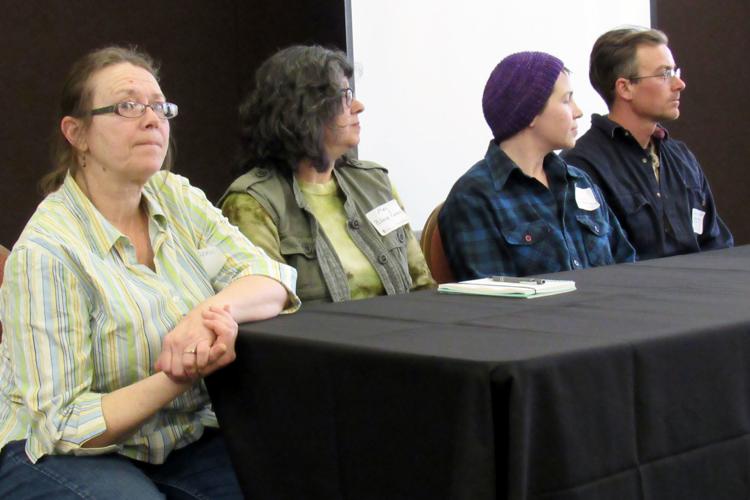
RIVER FALLS — From the rigors of becoming a licensed cheesemaker in Wisconsin to educating customers, dairy farmers who have donned the additional hat of being their own processor say it’s not for the faint of heart.
They made no bones about what it takes, as well as the price-control opportunities, during a workshop on value-added milk production March 27 in River Falls. Among the biggest barriers mentioned were financing, finding a place to do a cheesemaking apprenticeship, juggling a new venture with farming and navigating the regulatory world.
But it can be well worth the effort.
“When I started, I never thought processing plants would be telling farmers they wouldn’t take their milk. When it started happening, I felt we did something really smart on our farm,” said Theresa Depies of Springbrook Dairy near Hayward. “This has allowed me to take control of what I’m going to get paid for my milk; that was huge.”
One step at a time
Josh Bryceson of Cosmic Wheel Creamery near Clear Lake said he and his wife, Rama Hoffpauir, entered the processing realm “step by step. We never set a hard date (for launch) until we got really close.”
Bryceson and Hoffpauir began their creamery in 2015 to supplement their Turnip Rock Farm, where they offer vegetables, eggs, meat and cheese through a Community-Supported Agriculture enterprise. Bryceson said they started with a family cow and experimented with cheesemaking in small batches at home, for their own enjoyment.
Eventually, “we thought it might be a business to pursue,” he said.
They make a few varieties of fresh cheeses, as well as six kinds of aged cheeses that they can sell year-round. They do aged cheeses for cash-flow reasons, Hoffpauir said, so they have something to sell when the cows are dry. She said they must provide a variety because of their CSA, but in the future, she’d like to make fewer cheeses and do more wholesale.
The family’s 20-cow mixed-breed herd calves in the spring and goes dry in the fall. Bryceson handles the once-a-day milking, while Hoffpauir makes cheese. Annual milk production averages 8,000 to 10,000 pounds per cow. Cosmic Wheel makes 6,000-8,000 pounds of cheese each year, selling aged cheeses for $14 per pound at wholesale and $20 per pound at market. Fresh cheeses go for $1 per ounce at market.
Hoffpauir said the dairy is a good fit with the rest of their operation, as they can compost the livestock manure and bedding for use on their gardens and feed the leftover whey to their pigs. With their artistic backgrounds, they also like the creativity that goes into cheesemaking.
“It’s really fulfilling for us,” Bryceson said.
Hoffpauir said the most difficult part of the process was finding a place to fulfill her cheesemaking apprenticeship requirement. She made as many as 50 phone calls to find a place that would take her; most either didn’t return her call or said no. Through a friend, she finally got in at Castle Rock Organic Farms in Osseo.
But “it’s hard to get through that while working on the farm,” she said, adding that it took her five years to complete.
It’s also difficult to find the time to wade through all the rules and regulations; larger plants have staff for that, while most farmers already are stretched thin. Hoffpauir said the program should be made more accessible for more people. In the future, she hopes to take more classes to expand her knowledge base.
“I want it to be easy to be in compliance and to be up-to-date,” she said.
Filling a niche
Meg Wittenmyer of Bifrost Farms near Boyceville is seeing success after retrofitting an existing building on her farm for milking goats and making cheese. She operates the only farmstead goat creamery in western Wisconsin, and that niche is a big part of her marketing plan.
“People love coming out, looking at the creamery, petting the baby goats in the barn,” she said. “I want to add agritourism sometime, maybe a yurt. If you want to milk my goats, go for it.”
Wittenmyer said she opened her creamery “on a shoestring” budget, buying 75 percent of her equipment used, and she and her husband did much of the work themselves. “We got commercially licensed for under $50,000.”
Wittenmyer sells her cheeses for a little more than $1 an ounce at the Menomonie farmers’ market and wholesale at restaurants in Eau Claire and restaurants and food co-ops in the Twin Cities. She makes deliveries to the Twin Cities every two weeks, avoiding use of a distributor.
“My goal is to concentrate more on the wholesale route,” she said.
Wittenmyer said she is milking up to 10 goats and hopes to max out at about 20, with a total herd numbering about 50 head. Entering her fourth season, she said she is looking for some help with milking so she can focus on cheesemaking. She recently receive a grant to install some aging space, which will give her an outlet for extra milk.
While it wasn’t easy, she said, “in retrospect, I’m glad to have a cheesemaker’s license.”
Wittenmyer, who did her cheesemaking apprenticeship at Comstock Creamery, said she now can return the favor by opening up her creamery to apprentices. Recently, she joined with six other farms to offer a whole-diet CSA to customers.
Education is key to market development, she said. “Take the time to explain what you’re putting into this. I hardly have anybody tell me my cheese is too expensive.”
She said it hasn’t made sense for her to pursue organic certification so far: “My market supports local more than organic.”
While educating customers, she also continues to educate herself, in part through online groups for artisan cheesemakers and small dairies.
“I’m still learning every year. Always,” she said.
Some patience required
Processing her own milk and selling products locally has paid off for Depies, who opened her creamery more than 20 years ago and worked to get her products into about 24 grocery stores. She started by bottling fluid milk but has since added fresh cheeses including quark.
“I can’t keep fluid milk on the shelf,” she said.
Depies, who bought her farm in 1990 and milks 25 Jersey cows, said the idea of sending her milk off on the truck and accepting a given price never appealed to her.
“I didn’t like the system,” she said.
It took about three years to get her cheesemaker’s license. Due to a lack of plants in her area, she said, she put up a Grade A dairy plant so a cheesemaker would come to her. She has since let her Grade A certification lapse due to cost and a smaller milk supply. She also dropped her organic certification 1-1/2 years ago because of the expense.
“My stores don’t mind now,” she said. “It might have made a difference in the beginning.”
Depies said her biggest struggle was financing, and her biggest mistake with bankers was talking about her project in terms of its small size.
“Bean-counters usually don’t think that’s a good idea,” she said. “They’re all looking for progress.”
Dairy farmers going this route must be patient and strive to have a good working relationship with their inspector, she said.
Depies said the financial return on her cheese is much greater than what she sees for fluid milk, which sells at wholesale for $9 per gallon, so she’s been focusing more on cheese lately. She recommends setting prices on the higher side.
“It’s easier to lower your price than to raise it. Don’t be afraid to go a little high, because you can always go down,” she said. “I have to make money. If you’re not going to make any money, that doesn’t help anybody.”
She doesn’t plan to get back into fluid milk until she gets more help on the farm. When she began, four of her five children still lived at home. Now, none of them are home. Her son hopes to eventually return to the farm but likely won’t be able to for a few more years.
Depies said getting her market established has required “a lot of educating in the back of grocery stores.” Retailers and consumers need to know who put in the work behind value-added dairy products and why they’re worth more.
“Retailers are looking for the product that we have,” Depies said, but “I don’t waste time trying to convince someone I have a good product; if they’re not on board right away, that’s OK; I just look for someone else who is on board.”
Depies said she realizes she probably won’t see all the long-term benefits of her taking on the processing and marketing aspects of her business, but she hopes her children and grandchildren will.























